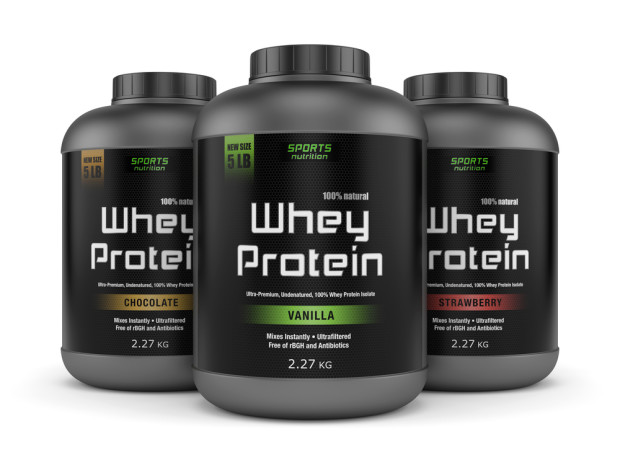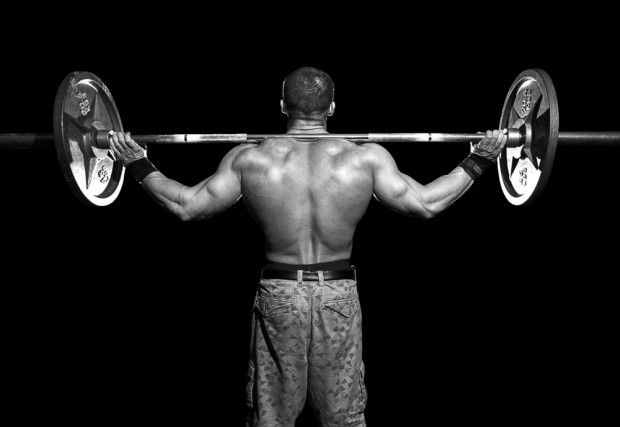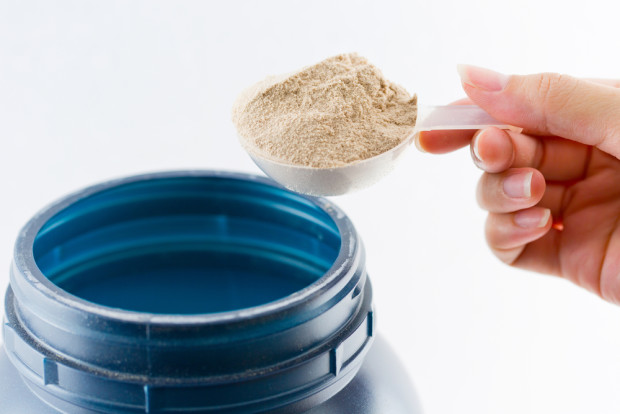


Everyone has walked into a nutrition store and seen a ridiculously huge wall of protein powder tubs. With phrases like “instantized hydrolyzed cross-flow cold-processed microfiltration,” it can be a daunting task to find the protein that fits your needs. And if that’s not confusing enough, a dude-bro on staff will usually try to sell you something he doesn’t understand and you probably don’t need.
The truth is, all protein powders are complete proteins and they all promote protein synthesis; however, each type has additional benefits that go beyond just getting you swole. Some blunt hunger, other help keep you from getting sick, and others can even quell post-training soreness. You’re going to get that muscle-repairing benefit, but beyond that is where protein selection becomes important. Tailoring your protein powder to your specific physique goals will make your journey that much faster and more efficient.
Whey Protein Concentrate
Whey protein concentrate may be the best known and most common protein powder on the market. Whey is the liquid by-product of cheese production, so it does contain dairy. It has a relatively low level of fat and cholesterol, and is somewhere between 30 and 90 percent protein by weight. It can be found at almost any grocery store nowadays. Another bonus? Whey protein concentrate is really affordable compared to some of the others out there.
Don’t equate inexpensive with cheap, in this case. Whey concentrate is a workhorse. It not only helps you build and maintain muscle mass, but it also lessens risk factors for many metabolic diseases. In fact, studies have shown that whey protein concentrate can help reduce blood sugar levels and increases good hormones such as leptin, a satiety hormone that lets you know you’re full, which will ultimately benefit your weight-loss efforts. It also reduces ghrelin, which is the hormone that is known as the “hunger hormone.” Lower levels of ghrelin keep you from mindlessly eating your face off. Whey protein concentrate can even boost the immune system and provide a greater immune response to protect you against things like the common cold and flu.
Hydrolyzed Whey Protein
Hydrolyzed whey protein is whey that has been broken down through the process of hydrolysis. This makes it easier to metabolize (since it’s already predigested) and speeds digestion to increase delivery to muscle tissue. And since it’s predigested and contains an abundant amount of leucine, it helps you recover faster and adapt to stress. Therefore, if you’re trying to take advantage of your anabolic window, this may be the protein for you. Additionally, it contains almost zero lactose compared to concentrate and is an option for those who may be intolerant to dairy.
Hydrolyzed whey protein has some unique benefits that further separate it from whey protein concentrate. Since hydrolyzed whey protein elicits a greater insulin response compared to whey concentrate, you’ll get the anabolic and carb-partitioning properties of insulin without consuming a ton of calories from simple sugars. Hydrolyzed whey protein has greater antioxidant activity, resulting in reduced oxidative stress and potential DNA damage. It has also been shown to have a pain-relieving effect by binding to special pain-sensing nerve endings. And because of its anti-inflammatory properties, hydrolyzed whey protein may help reduce the symptoms of diseases such as arthritis, cancer, and even Crohn’s disease.
Casein Protein
Casein protein is also derived from milk. Because of its structure, casein doesn’t dissolve in water. Instead, it forms a gel-like substance in the stomach. This results in a slow release of amino acids that can last for several hours. This steady drip of amino acids can be very beneficial at night, especially during periods of caloric restriction, because it prevents catabolism not to mention waking for late-night munchies.
Casein protein also has some other great benefits. All protein powders have an anabolic effect; however, casein has been shown to have a longer-lasting anabolic effect compared to some others. This is likely due to the slow release of amino acids into the blood, which helps maximize your anabolic window post-exercise and improve post-exercise overnight recovery. Additionally, casein protein has been shown to have greater fat-burning characteristics to aid in weight loss. Leaning out? Seems like casein may be your choice to help with that.
Hemp Protein
Hemp protein has been becoming more popular over the last few years, especially with vegan athletes. It’s produced from hemp seeds, the same type that gives us cannabis, although hemp protein has no psychoactive properties. Hemp seeds are typically hydrolyzed into amino acids making it easy to digest. Like whey and casein, it triggers protein synthesis; however, hemp boasts some other benefits that may not be as obvious.
Hemp protein is high in glutamine, which is an important amino acid that is a source of cellular energy and aids in recovery. Since hemp seeds contain omega-3s, it also helps reduce your risk of cancer and heart disease. Hemp protein has also been shown to reduce oxidative stress and blood pressure by decreasing inflammation. It’s also been shown to protect against kidney disease by reducing the size of cysts within the organs. Therefore, if you’re searching for a great source of protein that is vegan, high in omerga-3s, and speeds recovery, hemp protein might be for you.
Egg Protein
Egg protein is another favorite of those who are lactose intolerant or vegetarian, and is a good choice for the Paleo crowd who stay away from dairy. It’s typically made from egg whites and then dried into a powder; however, some powders may also include the yolk. Therefore, you may still receive some of the benefits that come with eggs, such as increasing levels of good cholesterol and being a potent source of choline, a nutrient that’s important for brain function.
Since most egg protein is an isolate, they’re low in fat and lactose, and high in protein by weight. Egg protein is metabolized fairly quickly, which makes it a great option for use during the post-workout anabolic window. Research also suggests that it promotes satiety and reduces short-term food intake, making it a great choice for those who are restricting calories in an effort to lean out. Egg protein has also been known to have higher amounts of the antioxidant vitamin E than other protein powders. For anyone who makes protein muffins or other amino-laced baked goods, egg protein is a good choice to bake with since it does not denature as readily when exposed to high temperatures compared to other protein powders.
The Anabolic Window
The anabolic window, which is sometimes referred to as the metabolic window, is the time frame after exercise where there is a higher rate of protein synthesis due to a shift from a catabolic state (breakdown) to an anabolic state (building). During this time, it benefits you to take in certain nutrients to help maximize this process. The anabolic window can vary a certain degree from person to person and workout to workout, but here are a few facts to help you get the jump on your post-workout recovery.
– The window is not limited to 30 minutes, at least not for everybody. Recent research suggests that the anabolic window lasts anywhere between 15 minutes to 90 minutes post-exercise.
– Not only is protein synthesis upregulated, there is also an increase in glucose uptake. This makes it an ideal time for indulging in any simple carbs, like those cupcakes you’ve been eyeing, because they will go toward replenishing your depleted glycogen stores.
– If you just did some endurance training or a serious marathon session in the gym (90 to 120 minutes), the optimal carbohydrate-to-protein ratio for recovery is somewhere around 4:1 (carbs:protein.) Chocolate milk, anyone?
By Jenevieve Roper, PhD (ABD), CSCS






















You must be logged in to post a comment Login